Transmission of Cultural Values from African American Fathers to Sons
VerifiedAdded on 2022/11/18
|5
|1285
|404
AI Summary
Transmission of cultural values from an older generation to a younger generation forms the base for a holistic cultural development of an individual while at the same time accommodating for richness and the nuances of values associated with each culture. The researchers in the current study were able to identify the roles African – American fathers play in instilling certain cultural values in their children, however they lacked the knowledge of what those specific values were.
Contribute Materials
Your contribution can guide someone’s learning journey. Share your
documents today.
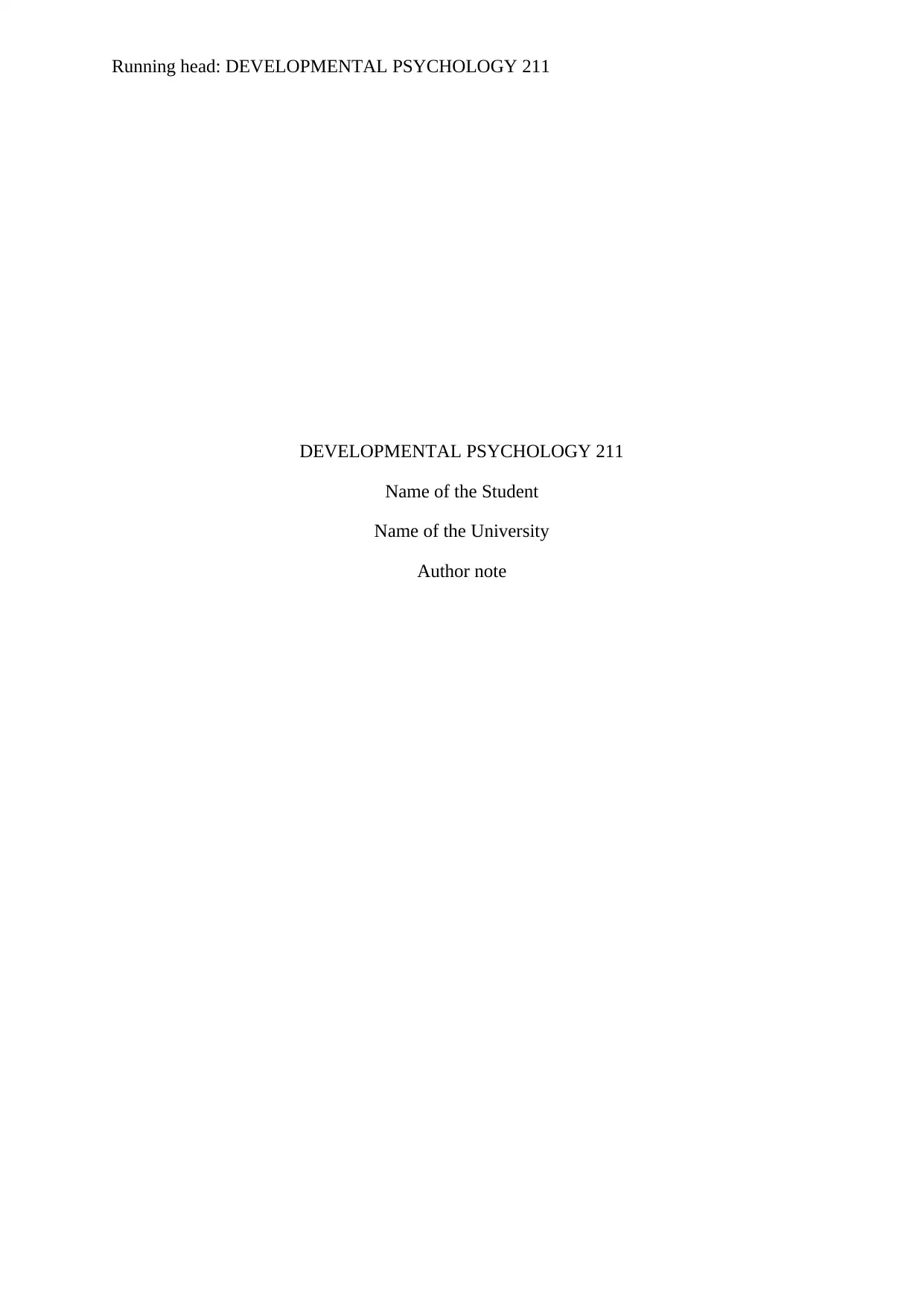
Running head: DEVELOPMENTAL PSYCHOLOGY 211
DEVELOPMENTAL PSYCHOLOGY 211
Name of the Student
Name of the University
Author note
DEVELOPMENTAL PSYCHOLOGY 211
Name of the Student
Name of the University
Author note
Secure Best Marks with AI Grader
Need help grading? Try our AI Grader for instant feedback on your assignments.
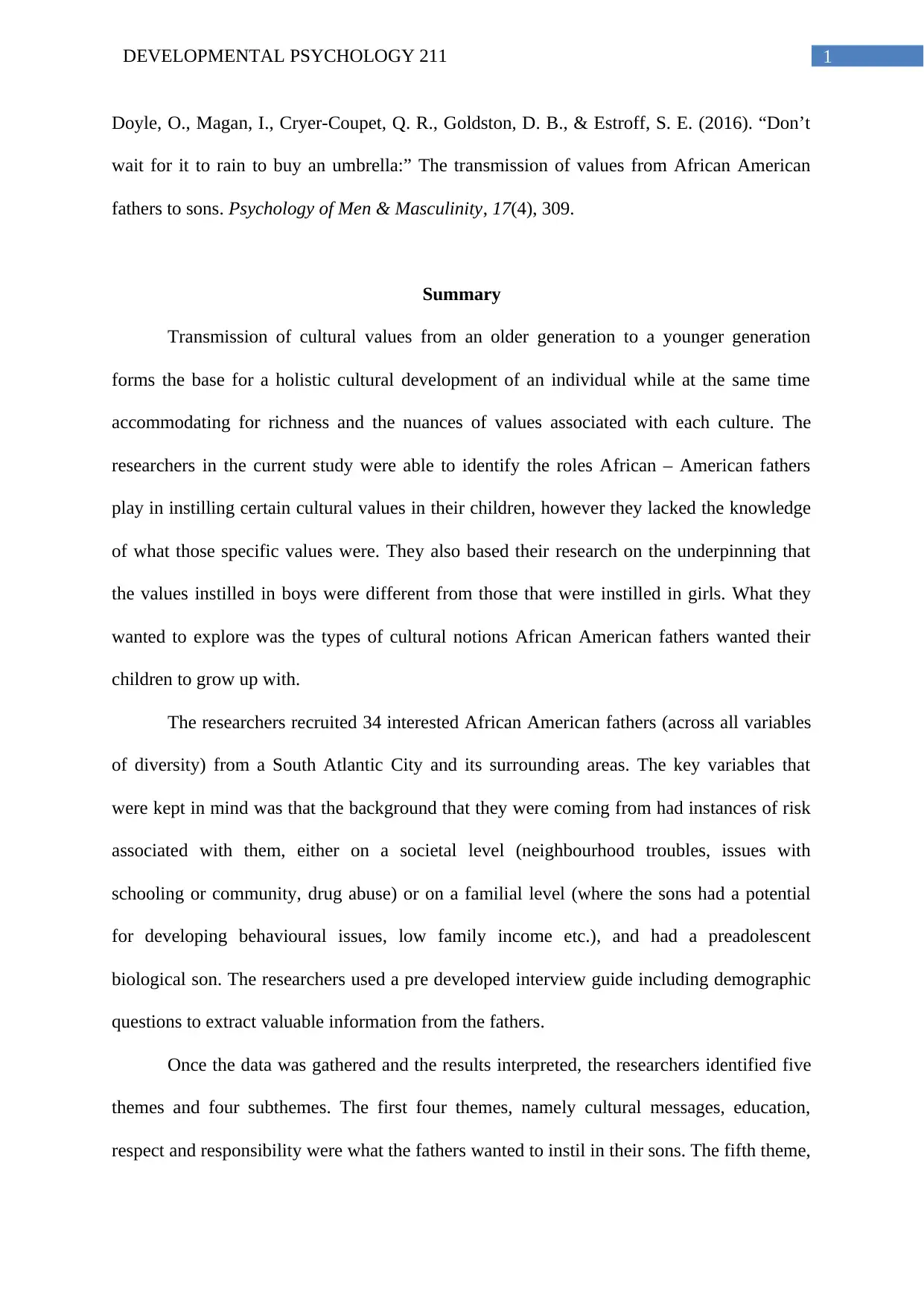
1DEVELOPMENTAL PSYCHOLOGY 211
Doyle, O., Magan, I., Cryer-Coupet, Q. R., Goldston, D. B., & Estroff, S. E. (2016). “Don’t
wait for it to rain to buy an umbrella:” The transmission of values from African American
fathers to sons. Psychology of Men & Masculinity, 17(4), 309.
Summary
Transmission of cultural values from an older generation to a younger generation
forms the base for a holistic cultural development of an individual while at the same time
accommodating for richness and the nuances of values associated with each culture. The
researchers in the current study were able to identify the roles African – American fathers
play in instilling certain cultural values in their children, however they lacked the knowledge
of what those specific values were. They also based their research on the underpinning that
the values instilled in boys were different from those that were instilled in girls. What they
wanted to explore was the types of cultural notions African American fathers wanted their
children to grow up with.
The researchers recruited 34 interested African American fathers (across all variables
of diversity) from a South Atlantic City and its surrounding areas. The key variables that
were kept in mind was that the background that they were coming from had instances of risk
associated with them, either on a societal level (neighbourhood troubles, issues with
schooling or community, drug abuse) or on a familial level (where the sons had a potential
for developing behavioural issues, low family income etc.), and had a preadolescent
biological son. The researchers used a pre developed interview guide including demographic
questions to extract valuable information from the fathers.
Once the data was gathered and the results interpreted, the researchers identified five
themes and four subthemes. The first four themes, namely cultural messages, education,
respect and responsibility were what the fathers wanted to instil in their sons. The fifth theme,
Doyle, O., Magan, I., Cryer-Coupet, Q. R., Goldston, D. B., & Estroff, S. E. (2016). “Don’t
wait for it to rain to buy an umbrella:” The transmission of values from African American
fathers to sons. Psychology of Men & Masculinity, 17(4), 309.
Summary
Transmission of cultural values from an older generation to a younger generation
forms the base for a holistic cultural development of an individual while at the same time
accommodating for richness and the nuances of values associated with each culture. The
researchers in the current study were able to identify the roles African – American fathers
play in instilling certain cultural values in their children, however they lacked the knowledge
of what those specific values were. They also based their research on the underpinning that
the values instilled in boys were different from those that were instilled in girls. What they
wanted to explore was the types of cultural notions African American fathers wanted their
children to grow up with.
The researchers recruited 34 interested African American fathers (across all variables
of diversity) from a South Atlantic City and its surrounding areas. The key variables that
were kept in mind was that the background that they were coming from had instances of risk
associated with them, either on a societal level (neighbourhood troubles, issues with
schooling or community, drug abuse) or on a familial level (where the sons had a potential
for developing behavioural issues, low family income etc.), and had a preadolescent
biological son. The researchers used a pre developed interview guide including demographic
questions to extract valuable information from the fathers.
Once the data was gathered and the results interpreted, the researchers identified five
themes and four subthemes. The first four themes, namely cultural messages, education,
respect and responsibility were what the fathers wanted to instil in their sons. The fifth theme,
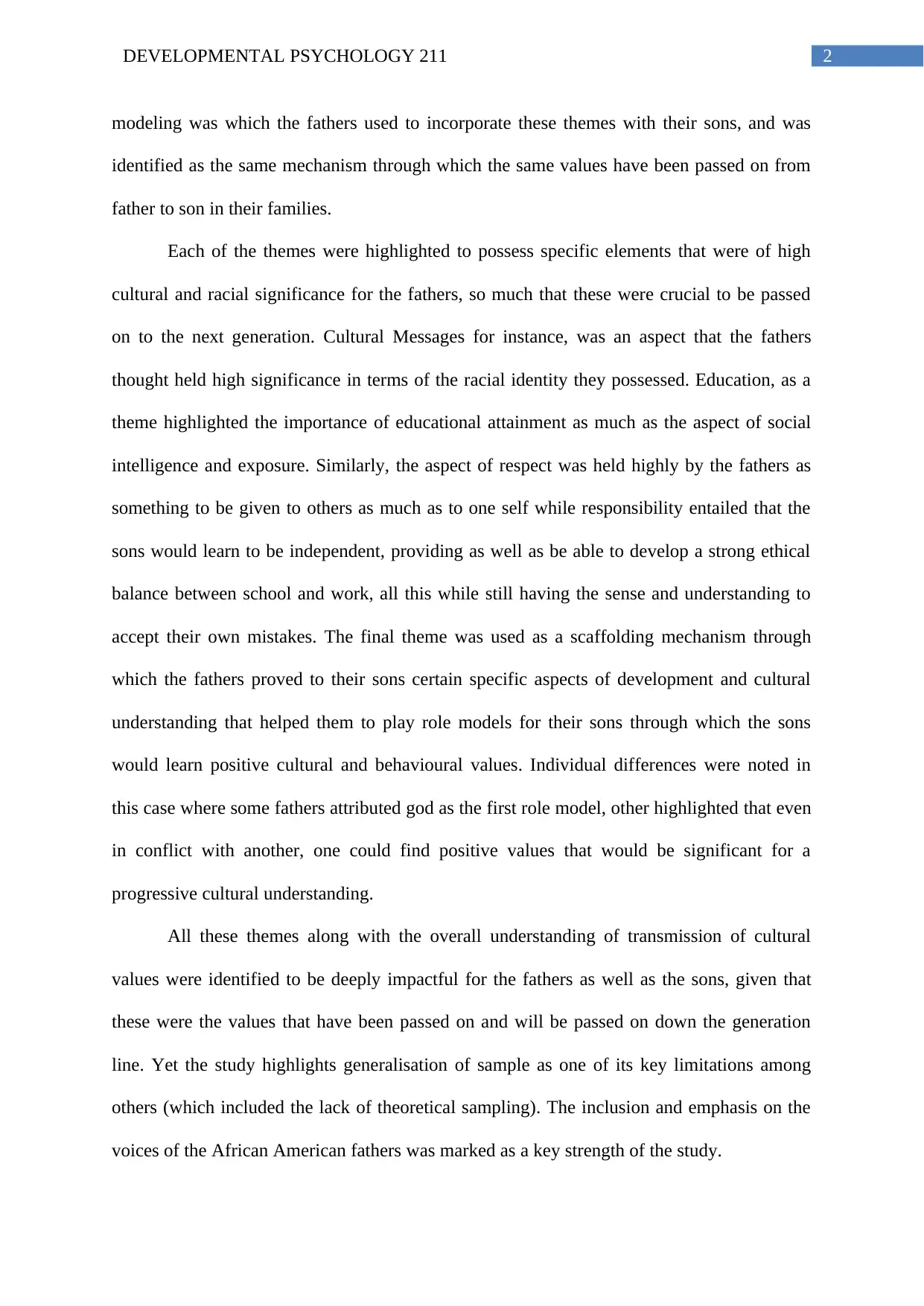
2DEVELOPMENTAL PSYCHOLOGY 211
modeling was which the fathers used to incorporate these themes with their sons, and was
identified as the same mechanism through which the same values have been passed on from
father to son in their families.
Each of the themes were highlighted to possess specific elements that were of high
cultural and racial significance for the fathers, so much that these were crucial to be passed
on to the next generation. Cultural Messages for instance, was an aspect that the fathers
thought held high significance in terms of the racial identity they possessed. Education, as a
theme highlighted the importance of educational attainment as much as the aspect of social
intelligence and exposure. Similarly, the aspect of respect was held highly by the fathers as
something to be given to others as much as to one self while responsibility entailed that the
sons would learn to be independent, providing as well as be able to develop a strong ethical
balance between school and work, all this while still having the sense and understanding to
accept their own mistakes. The final theme was used as a scaffolding mechanism through
which the fathers proved to their sons certain specific aspects of development and cultural
understanding that helped them to play role models for their sons through which the sons
would learn positive cultural and behavioural values. Individual differences were noted in
this case where some fathers attributed god as the first role model, other highlighted that even
in conflict with another, one could find positive values that would be significant for a
progressive cultural understanding.
All these themes along with the overall understanding of transmission of cultural
values were identified to be deeply impactful for the fathers as well as the sons, given that
these were the values that have been passed on and will be passed on down the generation
line. Yet the study highlights generalisation of sample as one of its key limitations among
others (which included the lack of theoretical sampling). The inclusion and emphasis on the
voices of the African American fathers was marked as a key strength of the study.
modeling was which the fathers used to incorporate these themes with their sons, and was
identified as the same mechanism through which the same values have been passed on from
father to son in their families.
Each of the themes were highlighted to possess specific elements that were of high
cultural and racial significance for the fathers, so much that these were crucial to be passed
on to the next generation. Cultural Messages for instance, was an aspect that the fathers
thought held high significance in terms of the racial identity they possessed. Education, as a
theme highlighted the importance of educational attainment as much as the aspect of social
intelligence and exposure. Similarly, the aspect of respect was held highly by the fathers as
something to be given to others as much as to one self while responsibility entailed that the
sons would learn to be independent, providing as well as be able to develop a strong ethical
balance between school and work, all this while still having the sense and understanding to
accept their own mistakes. The final theme was used as a scaffolding mechanism through
which the fathers proved to their sons certain specific aspects of development and cultural
understanding that helped them to play role models for their sons through which the sons
would learn positive cultural and behavioural values. Individual differences were noted in
this case where some fathers attributed god as the first role model, other highlighted that even
in conflict with another, one could find positive values that would be significant for a
progressive cultural understanding.
All these themes along with the overall understanding of transmission of cultural
values were identified to be deeply impactful for the fathers as well as the sons, given that
these were the values that have been passed on and will be passed on down the generation
line. Yet the study highlights generalisation of sample as one of its key limitations among
others (which included the lack of theoretical sampling). The inclusion and emphasis on the
voices of the African American fathers was marked as a key strength of the study.
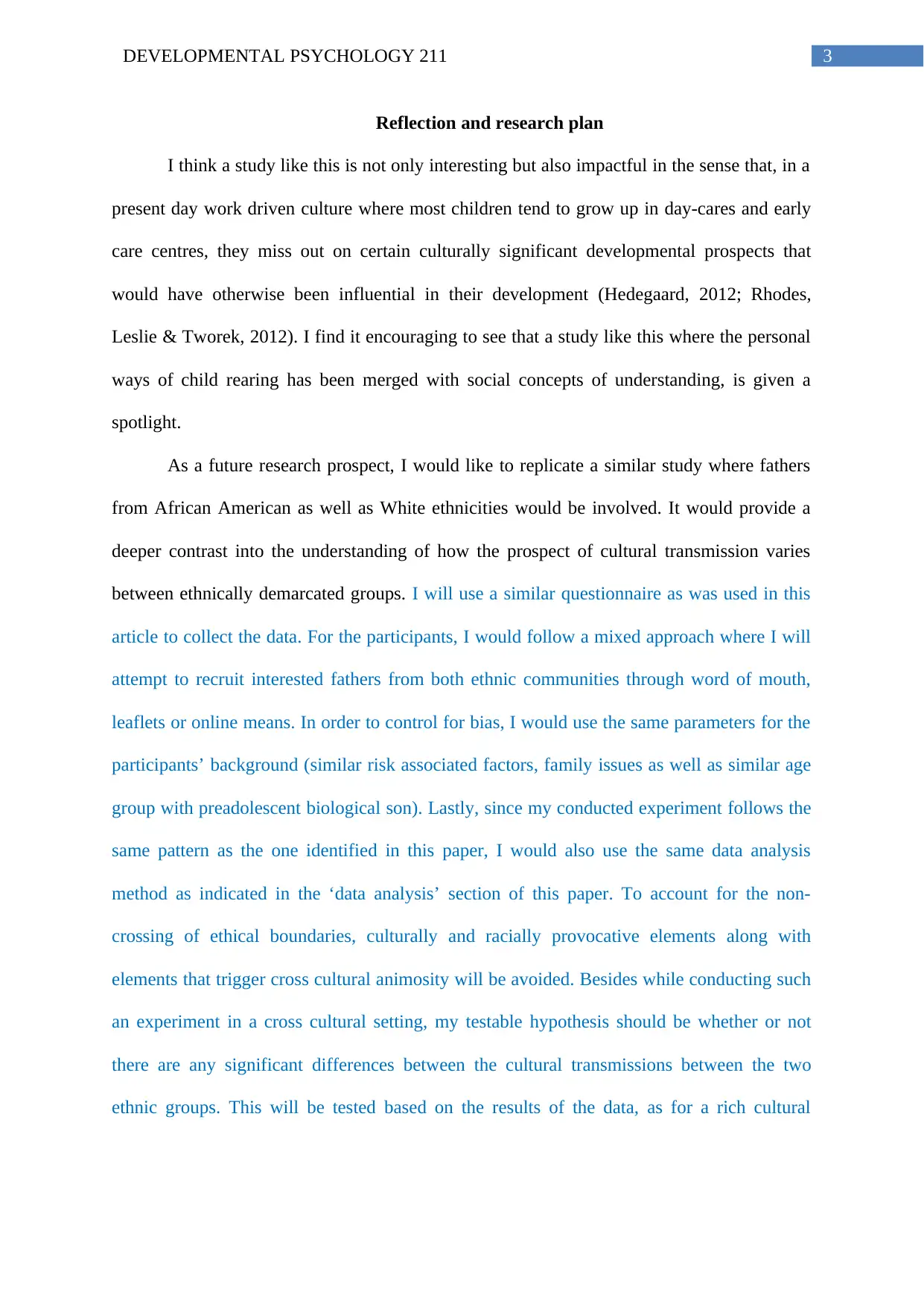
3DEVELOPMENTAL PSYCHOLOGY 211
Reflection and research plan
I think a study like this is not only interesting but also impactful in the sense that, in a
present day work driven culture where most children tend to grow up in day-cares and early
care centres, they miss out on certain culturally significant developmental prospects that
would have otherwise been influential in their development (Hedegaard, 2012; Rhodes,
Leslie & Tworek, 2012). I find it encouraging to see that a study like this where the personal
ways of child rearing has been merged with social concepts of understanding, is given a
spotlight.
As a future research prospect, I would like to replicate a similar study where fathers
from African American as well as White ethnicities would be involved. It would provide a
deeper contrast into the understanding of how the prospect of cultural transmission varies
between ethnically demarcated groups. I will use a similar questionnaire as was used in this
article to collect the data. For the participants, I would follow a mixed approach where I will
attempt to recruit interested fathers from both ethnic communities through word of mouth,
leaflets or online means. In order to control for bias, I would use the same parameters for the
participants’ background (similar risk associated factors, family issues as well as similar age
group with preadolescent biological son). Lastly, since my conducted experiment follows the
same pattern as the one identified in this paper, I would also use the same data analysis
method as indicated in the ‘data analysis’ section of this paper. To account for the non-
crossing of ethical boundaries, culturally and racially provocative elements along with
elements that trigger cross cultural animosity will be avoided. Besides while conducting such
an experiment in a cross cultural setting, my testable hypothesis should be whether or not
there are any significant differences between the cultural transmissions between the two
ethnic groups. This will be tested based on the results of the data, as for a rich cultural
Reflection and research plan
I think a study like this is not only interesting but also impactful in the sense that, in a
present day work driven culture where most children tend to grow up in day-cares and early
care centres, they miss out on certain culturally significant developmental prospects that
would have otherwise been influential in their development (Hedegaard, 2012; Rhodes,
Leslie & Tworek, 2012). I find it encouraging to see that a study like this where the personal
ways of child rearing has been merged with social concepts of understanding, is given a
spotlight.
As a future research prospect, I would like to replicate a similar study where fathers
from African American as well as White ethnicities would be involved. It would provide a
deeper contrast into the understanding of how the prospect of cultural transmission varies
between ethnically demarcated groups. I will use a similar questionnaire as was used in this
article to collect the data. For the participants, I would follow a mixed approach where I will
attempt to recruit interested fathers from both ethnic communities through word of mouth,
leaflets or online means. In order to control for bias, I would use the same parameters for the
participants’ background (similar risk associated factors, family issues as well as similar age
group with preadolescent biological son). Lastly, since my conducted experiment follows the
same pattern as the one identified in this paper, I would also use the same data analysis
method as indicated in the ‘data analysis’ section of this paper. To account for the non-
crossing of ethical boundaries, culturally and racially provocative elements along with
elements that trigger cross cultural animosity will be avoided. Besides while conducting such
an experiment in a cross cultural setting, my testable hypothesis should be whether or not
there are any significant differences between the cultural transmissions between the two
ethnic groups. This will be tested based on the results of the data, as for a rich cultural
Secure Best Marks with AI Grader
Need help grading? Try our AI Grader for instant feedback on your assignments.
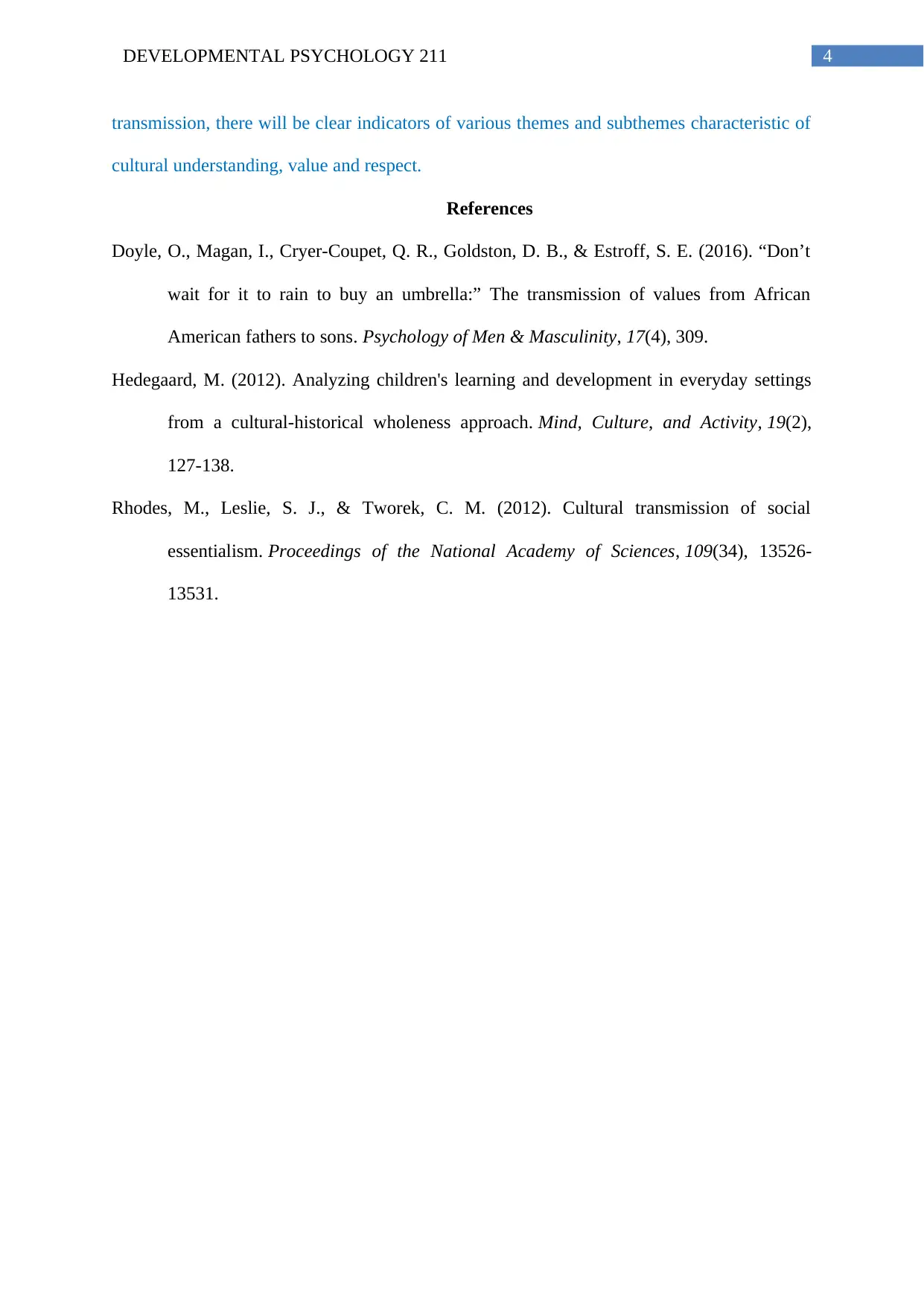
4DEVELOPMENTAL PSYCHOLOGY 211
transmission, there will be clear indicators of various themes and subthemes characteristic of
cultural understanding, value and respect.
References
Doyle, O., Magan, I., Cryer-Coupet, Q. R., Goldston, D. B., & Estroff, S. E. (2016). “Don’t
wait for it to rain to buy an umbrella:” The transmission of values from African
American fathers to sons. Psychology of Men & Masculinity, 17(4), 309.
Hedegaard, M. (2012). Analyzing children's learning and development in everyday settings
from a cultural-historical wholeness approach. Mind, Culture, and Activity, 19(2),
127-138.
Rhodes, M., Leslie, S. J., & Tworek, C. M. (2012). Cultural transmission of social
essentialism. Proceedings of the National Academy of Sciences, 109(34), 13526-
13531.
transmission, there will be clear indicators of various themes and subthemes characteristic of
cultural understanding, value and respect.
References
Doyle, O., Magan, I., Cryer-Coupet, Q. R., Goldston, D. B., & Estroff, S. E. (2016). “Don’t
wait for it to rain to buy an umbrella:” The transmission of values from African
American fathers to sons. Psychology of Men & Masculinity, 17(4), 309.
Hedegaard, M. (2012). Analyzing children's learning and development in everyday settings
from a cultural-historical wholeness approach. Mind, Culture, and Activity, 19(2),
127-138.
Rhodes, M., Leslie, S. J., & Tworek, C. M. (2012). Cultural transmission of social
essentialism. Proceedings of the National Academy of Sciences, 109(34), 13526-
13531.
1 out of 5
Related Documents
Your All-in-One AI-Powered Toolkit for Academic Success.
+13062052269
info@desklib.com
Available 24*7 on WhatsApp / Email
![[object Object]](/_next/static/media/star-bottom.7253800d.svg)
Unlock your academic potential
© 2024 | Zucol Services PVT LTD | All rights reserved.
